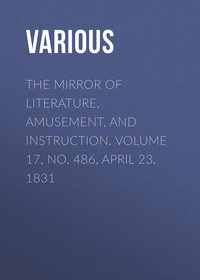The Mirror of Literature, Amusement, and Instruction. Volume 17, No. 486, April 23, 1831

Полная версия
Добавить В библиотекуАвторизуйтесь, чтобы добавить
Добавить отзывДобавить цитату
The Mirror of Literature, Amusement, and Instruction. Volume 17, No. 486, April 23, 1831
Авторизация